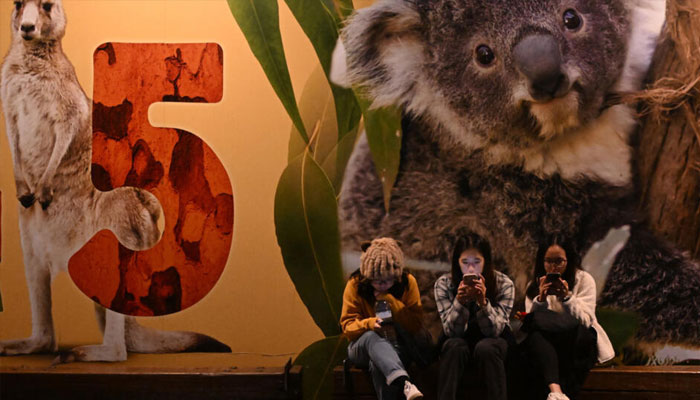Australia plans age limit to ban children from social media
SYDNEY: Australia will ban children from using social media with a minimum age limit as high as 16, the prime minister said on Tuesday, vowing to get kids off their devices and “onto the footy fields”.
Federal legislation to keep children off social media will be introduced this year, Anthony Albanese said, describing the impact of the sites on young people as a “scourge”.
The minimum age for children to log into sites such as Facebook, Instagram, and TikTok has not been decided but is expected to be between 14 and 16 years, Albanese said. The prime minister said his own preference would be a block on users aged below 16.
An age verification trial to test various approaches is being conducted over the coming months, the centre-left leader said.
“I want to see kids off their devices and onto the footy fields and the swimming pools and the tennis courts,” Albanese said.
“We want them to have real experiences with real people because we know that social media is causing social harm,” he told national broadcaster ABC. “This is a scourge. We know that there is mental health consequences for what many of the young people have had to deal with,” he said.
Australia´s conservative opposition leader Peter Dutton said he would support the government´s proposed age limit.
“Every day of delay leaves young kids vulnerable to the harms of social media and the time for relying on tech companies to enforce age limits,” he said.
Analysts warned, however, that an age limit may not help troubled children.
Daniel Angus, professor at Queensland University of Technology, said the government´s plan was “reckless”, coming before the final report of a joint parliamentary inquiry into the impact of social media on Australian society.
“This knee-jerk move undermines the joint inquiry and deliberative democratic principles and threatens to create serious harm by excluding young people from meaningful, healthy participation in the digital world,” said Angus, who leads the university´s digital media research centre.
The legislation could drive children to “lower quality online spaces”, he said, “removing an important means of societal connection”.
It is not even clear that the technology exists to reliably enforce such bans, said the University of Melbourne´s associate professor in computing and information technology, Toby Murray.
-
 Critics Target Palace Narrative After Andrew's Controversy Refuses To Die
Critics Target Palace Narrative After Andrew's Controversy Refuses To Die -
 Sarah Ferguson’s Delusions Take A Turn For The Worse: ‘She’s Been Deserted’
Sarah Ferguson’s Delusions Take A Turn For The Worse: ‘She’s Been Deserted’ -
 ICE Agents 'fake Car Trouble' To Arrest Minnesota Man, Family Says
ICE Agents 'fake Car Trouble' To Arrest Minnesota Man, Family Says -
 Camila Mendes Reveals How She Prepared For Her Role In 'Idiotka'
Camila Mendes Reveals How She Prepared For Her Role In 'Idiotka' -
 China Confirms Visa-free Travel For UK, Canada Nationals
China Confirms Visa-free Travel For UK, Canada Nationals -
 Inside Sarah Ferguson, Andrew Windsor's Emotional Collapse After Epstein Fallout
Inside Sarah Ferguson, Andrew Windsor's Emotional Collapse After Epstein Fallout -
 Bad Bunny's Star Power Explodes Tourism Searches For His Hometown
Bad Bunny's Star Power Explodes Tourism Searches For His Hometown -
 Jennifer Aniston Gives Peek Into Love Life With Cryptic Snap Of Jim Curtis
Jennifer Aniston Gives Peek Into Love Life With Cryptic Snap Of Jim Curtis -
 Prince Harry Turns Diana Into Content: ‘It Would Have Appalled Her To Be Repackaged For Profit’
Prince Harry Turns Diana Into Content: ‘It Would Have Appalled Her To Be Repackaged For Profit’ -
 Prince William's Love For His Three Children Revealed During Family Crisis
Prince William's Love For His Three Children Revealed During Family Crisis -
 Murder Suspect Kills Himself After Woman Found Dead In Missouri
Murder Suspect Kills Himself After Woman Found Dead In Missouri -
 Sarah Ferguson's Plea To Jeffrey Epstein Exposed In New Files
Sarah Ferguson's Plea To Jeffrey Epstein Exposed In New Files -
 Prince William Prepares For War Against Prince Harry: Nothing Is Off The Table Not Legal Ways Or His Influence
Prince William Prepares For War Against Prince Harry: Nothing Is Off The Table Not Legal Ways Or His Influence -
 'How To Get Away With Murder' Star Karla Souza Is Still Friends With THIS Costar
'How To Get Away With Murder' Star Karla Souza Is Still Friends With THIS Costar -
 Pal Reveals Prince William’s ‘disorienting’ Turmoil Over Kate’s Cancer: ‘You Saw In His Eyes & The Way He Held Himself’
Pal Reveals Prince William’s ‘disorienting’ Turmoil Over Kate’s Cancer: ‘You Saw In His Eyes & The Way He Held Himself’ -
 Poll Reveals Majority Of Americans' Views On Bad Bunny
Poll Reveals Majority Of Americans' Views On Bad Bunny




